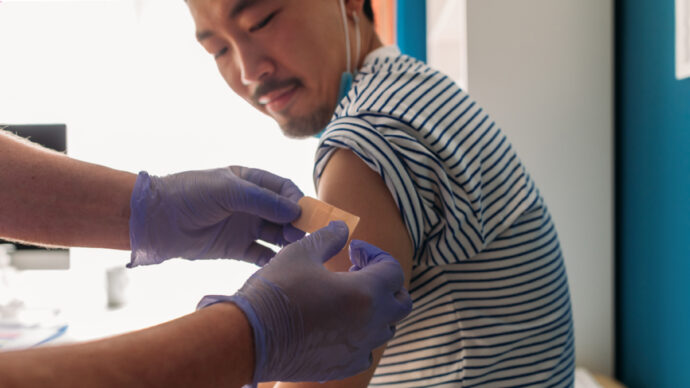
By The Centers for Disease Control and Prevention (CDC)
Author: Agam Rao, MD
Agam Rao, MD is the medical officer with the Poxvirus and Rabies Branch of the U.S. Centers for Disease Control and Prevention. Some of her responsibilities include leading the mpox vaccine work group of the Advisory Committee on Immunization Practices, overseeing CDC consultations of severe manifestations of mpox in the United States, and leading clinical or vaccine focused analytic studies about mpox.
1. Why should clinicians be concerned about mpox now?
Although the U.S. mpox outbreak has slowed considerably and more than 1.2 million doses of JYNNEOS have been administered, CDC research shows that less than 23% of those most at risk have been fully vaccinated. If vaccination and prevention efforts are not renewed, spring and summer events could lead to a resurgence of cases as people gather in crowds, particularly for gatherings with high potential for skin-to-skin contact or that are associated with increased sexual activity.
2. How does mpox spread, and who is at risk?
Mpox spreads through close personal contact, including direct contact with mpox rash and scabs. It can also spread through contact with saliva, upper respiratory secretions, and areas around the anus, rectum, or vagina. A person with mpox can spread it to others from the time symptoms start until the rash has fully healed and a fresh layer of skin has formed. Some people also have spread mpox to others from one to four days before their symptoms appear, but it’s not clear how many people this has affected . Those at higher risk include people living with HIV, gay, bisexual, and other MSM, as well as those in close contact with infected individuals or contaminated materials. Anyone can get mpox if exposed.
3. How can clinicians prevent the spread of mpox?
Clinicians can encourage their patients to receive the mpox vaccine, particularly those at higher risk of exposure, such as people living with HIV, gay, bisexual, and other MSM. Clinicians also can promote safe sex practices and proper hygiene to reduce the risk of mpox transmission.
4. What is the current recommendation for mpox vaccination, and how effective is it?
The mpox vaccine, JYNNEOS, is recommended for those at risk of exposure to mpox, including people traveling to areas where the virus is known to be present or those who are in close contact with infected individuals or contaminated materials. The vaccine is a two-dose series, given 4 weeks apart. All studies published to date have shown the mpox vaccine to be effective at preventing disease. Although point estimates for full vaccine effectiveness differed between studies, 95% confidence intervals overlapped, indicating no statistically significant difference between estimates.
5. What resources are available for clinicians to learn more about mpox and its prevention?
Clinicians can find more information about mpox and its prevention through CDC website, which includes guidance on clinical recognition, vaccination, specimen collection and testing, and treatment. Clinicians can also consult with public health officials for additional support and resources.
6. What is the status of mpox outbreaks in the United States?
Recently Chicago reported a cluster of mpox cases in the Chicago area, which indicates that transmission is increasing there. More than half of newly reported cases had previous mpox vaccination. Investigation of these cases is ongoing. There is a possibility of resurgence of mpox cases, especially during spring and summer events. It is important for clinicians to remain vigilant and be on the lookout for cases of mpox. CDC is updating messages and reminding partners of the potential for increased cases of mpox during these events.
7. Who should receive the mpox vaccine?
Everyone who is at risk of mpox exposure should receive the 2-dose series of the mpox vaccine. This includes people who live in or travel to areas where mpox is known to occur, people who work with animals that could carry the virus, and people who have close contact with others who have mpox. CDC also recommends mpox vaccination for people living with HIV, gay, bisexual, and other MSM. Clinicians should discuss the mpox vaccine with their patients and assess their risk of exposure to the virus to determine if vaccination is appropriate.
8.What other infections should healthcare providers be aware of that can be concurrent with mpox?
Clinicians should be aware of other infections that can be concurrent with mpox, including meningococcal infections, HIV, and sexually transmitted infections like syphilis.
About Sermo
Sermo is the original medical social network that empowers today’s physicians. Everyday thousands of fully verified physicians across more than 150 countries come to our platform to talk with peers, exchange medical knowledge, participate in paid medical studies, solve challenging patient cases, contribute to the world’s largest database of drug ratings – and enjoy a few laughs along the way.
Are you a physician or healthcare practitioner?
Explore the many benefits of Sermo’s medical community and join in on all the exciting conversations when you sign up for free today.
Resources
Mpox Vaccine Information for Healthcare Professionals | Mpox | Poxvirus | CDC
Clinical Guidance | Mpox | Poxvirus | CDC








